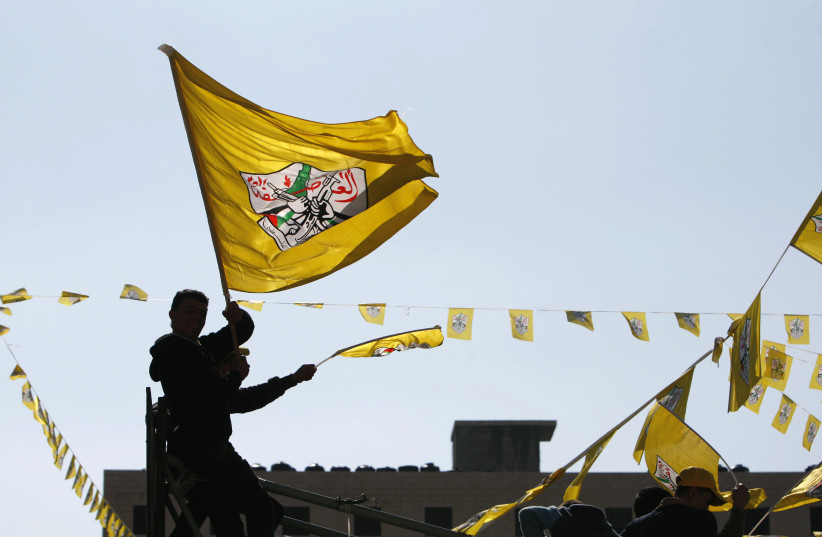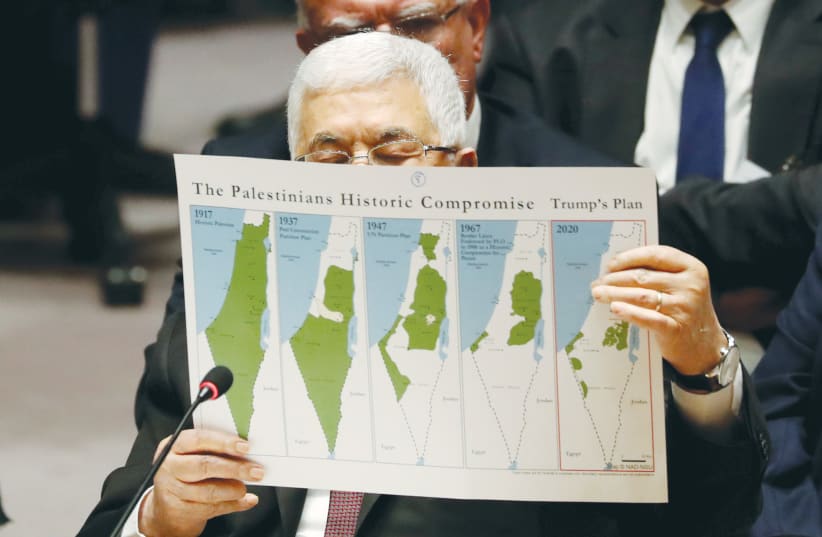In his first public comments since Tuesday’s meeting with Defense Minister Benny Gantz, Palestinian Authority President Mahmoud Abbas launched a scathing attack against Israel on Friday, accusing it of practicing “hideous policies of ethnic cleansing and organized terrorism” against Palestinians.
Abbas was speaking on the 57th anniversary of the launch of the first attack on Israel by his ruling Fatah faction.
The president did not mention in his speech the meeting with Gantz, which has been strongly condemned by several Palestinian factions and activists.
“The anniversary of the launch of our revolution comes in extremely critical and difficult circumstances due to the continuation of the abhorrent Israeli occupation, the escalation of its repressive practices and persecution against our people, the theft of our land and natural resources, the stifling of our economy, the withholding of our tax funds and racial discrimination,” he said.
Abbas praised the Palestinian security prisoners held in Israeli prisons for their “sacrifices and patience,” stressing that the Palestinian leadership will not abandon them or their families.


He also praised the “heroes of the popular resistance,” which refers to Palestinian attacks and protests against the IDF and settlers.
Abbas and other Fatah leaders have repeatedly called on Palestinians to step up the “popular resistance” in response to Israeli “crimes.”
“We reject house demolitions, land confiscation, the expulsion of Palestinians from their homes in [the east Jerusalem neighborhoods of] Sheikh Jarrah and Silwan, the uprooting of olive trees, the burning of [agricultural] fields, abuses against prisoners and the continuation of the siege of the Gaza Strip,” Abbas said.
Addressing Israeli leaders and settlers, he said that “we will not accept the continuation of your occupation and settlements on our land, and we have run out of patience with this bitter reality.”
Despite this reality, Abbas said, the Palestinians are ready to achieve “a just and comprehensive peace within the framework of an international conference to be held in accordance with the resolutions of international legitimacy, and under the auspices of the International Quartet [US, EU, UN and Russia], with the aim of ending the occupation of the land of the State of Palestine with its capital in Jerusalem.”
He said that the Palestinian Central Council (PCC) will meet soon “to study the latest developments and take the critical decisions necessary to confront these violations and crimes against our people and our land.”
The PCC is one of the PLO’s key policy making bodies.
In a statement marking the anniversary of its first attack against Israel, Fatah said that there would be no stability and peace in the region until the recognition of the Palestinians’ right to establish an independent Palestinian state with Jerusalem as its capital.
Fatah warned Israel against “harming the Palestinian, Arab, Islamic and Christian identity of Jerusalem and pursuing its schemes to Judaize the city.”
It also warned that Israel’s policies of settlement construction and “ethnic cleansing in Jerusalem would lead to the expansion of the popular resistance.”
PA Prime Minister Mohammad Shtayyeh, meanwhile, condemned Israel for the killing of a Palestinian who tried to stab Israeli civilians at a bus stop in the northern West Bank on Friday.
The assailant was identified as Amir Rayan, 37, a resident of the village of Karawat Bani Hassan.
“This hideous crime is an extension of the policy of killing for the sake of killing, which was announced by the leaders of the Israeli military establishment,” Shtayyeh said in a statement.
The PA Foreign Ministry also condemned the killing of Rayan and held the Israeli government “fully and directly responsible for this extrajudicial crime.”
